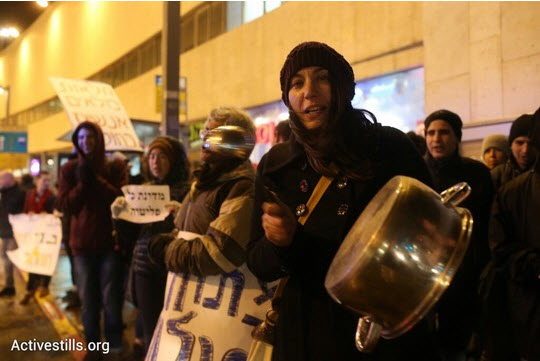On Friday night, January 9, as temperatures dropped to near freezing, the Israel Prison Service confiscated heaters from asylum seekers being held at the Holot detention facility in the Negev. Detainees claim that many of them remained in their beds for most of the day, wrapped in clothes and blankets, in an attempt to ward off the extreme cold. According to the Prison Service, the use of heaters is prohibited inside the cells because they pose a fire-hazard.

Activists protest in central Tel Aviv against the harsh conditions in the Holot prison, and against the refusal of prison authorities to allow heaters to be used there, January 10, 2015. (Photo: Activestills)
Following appeals by human rights groups and Knesset Member Dov Khenin (Hadash), heating pads were distributed by the facility to every cell. However, detainees complain that not only are heating pads inadequate to keep warm, but only three pads were distributed per 10 detainees. The Holot detention center, which opened about a year ago, currently houses over 2,200 asylum seekers from Sudan and Eritrea. Last week, the state resumed ordering asylum seekers to Holot, following three months in which no such warrants were issued.
The Ministry of the Interior ceased summoning asylum seekers to Holot back in September, when Israel’s Supreme Court overturned the law allowing them to be so detained. However, the Knesset passed new legislation allowing such detention just before disbanding last month. In response to several petitions against the new law, the Supreme Court issued a temporary injunction barring the ministry from using the new legislation to order asylum seekers to Holot.
However, last Tuesday, January 6, the Court removed this temporary injunction. An expanded panel of nine justices is slated to hear the petitions against the new law in February.


